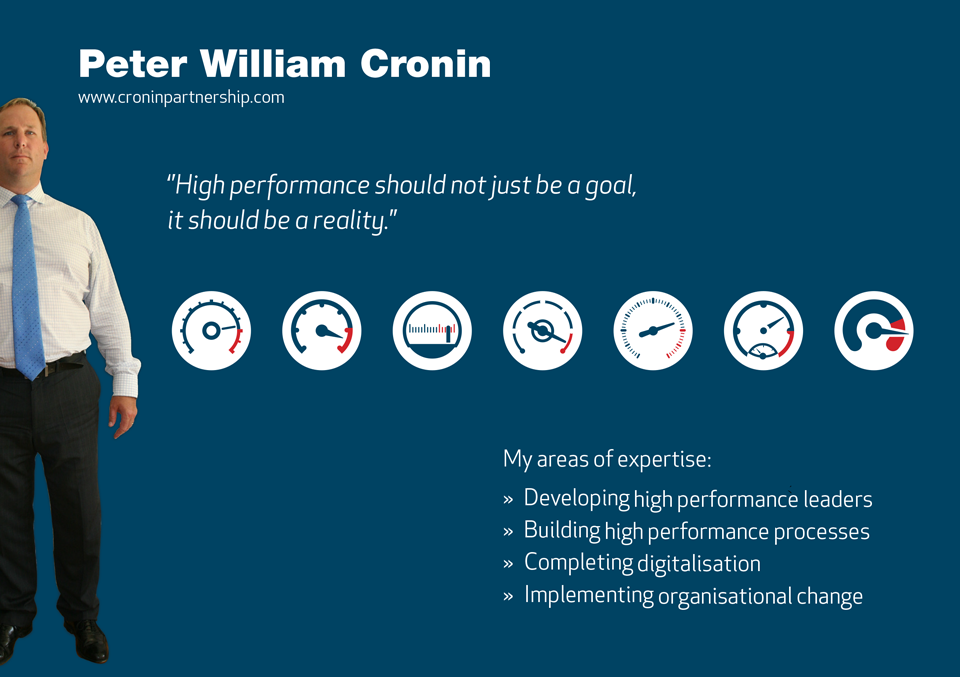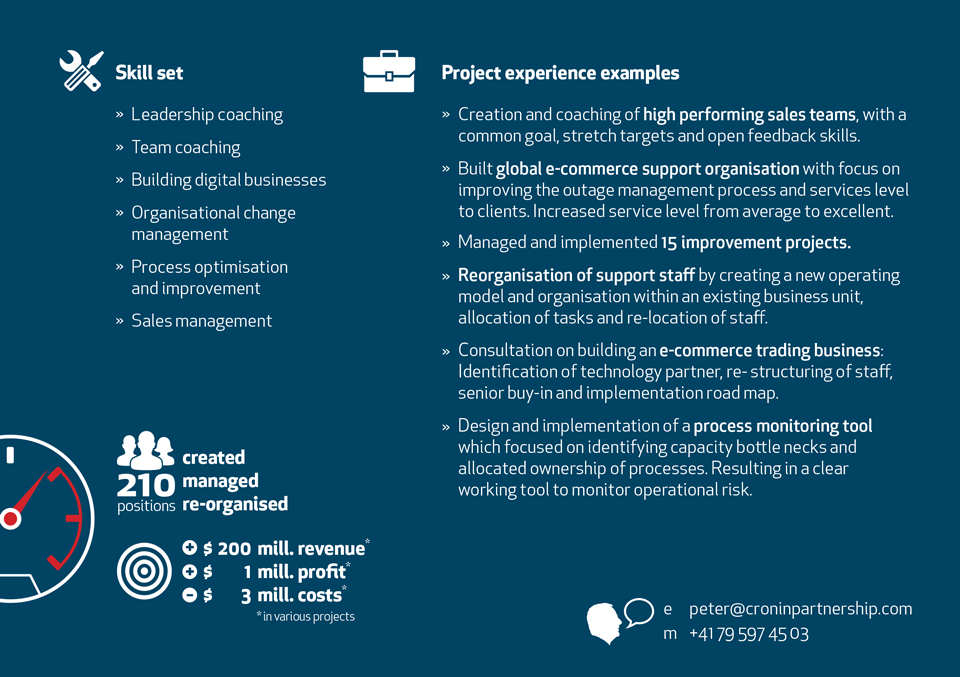High performance flyer
Building High Performance Teams: An Interview with Peter Cronin
Why you were happy to contribute to this publication?
Companies in Switzerland and elsewhere often focus on things that aren’t improvement, like cutting heads and cutting products and don’t focus on people. After leading and building teams, I have a passion for leadership and think the success that you get from doing it properly is massive in terms of performance and improving bottom line. I believe strongly in this so when I was asked to give my views on this I was happy to do so.
How would you define a high performing team?
Team members take personal responsibility, whilst working hard for each other and for the values of the company, they pursue [INVALID]ives relentlessly, expose under performance in others, never shrug their shoulders to failure, and they regard success of a team as a personal goal.
Do you believe that being a great leader is a skill that can be taught or do you need to be born a natural leader?
I strongly believe leadership is something that can be taught. I believe it is about teaching the current leaders the techniques and coaching skills to lead and build high performing teams. I believe people must be taught hands on practical skills and then follow up with continuous support in their operational environment.
Most people think of a leader as a decision maker or manager of a team. What does leadership mean to you and how does that impact a HPT?
“I want to inspire people with hope and optimism and I take responsibility for the success of the future.” If a leader could say that, I would follow him. I think a strong leader presents a compelling vision, promotes optimism, they wants action and urgency and results, they generate and sustain trust. They decide and they deliver. That is what I think a good leader does.
What is one of the key characteristics a strong leader must have?
Trust. People don’t need to like you but they have to trust you. If you are responsible for making decisions people have to trust the decision is correct, otherwise they won’t follow.
What is the biggest mistake you feel leaders make?
The most common mistake I saw was the decision to promote people into a managerial role when they were not ready. I have made that mistake myself and I see that happening all over, especially in the financial industry where a top performer in terms of revenue or clients is made a manager. That person may be great at business but that doesn’t always translate to management of people until they have the appropriate training / coaching.
Do you feel companies are making sure that it is just as rewarding to stay in the role you are good at, rather than moving into management?
No, companies don’t do this enough. There is hierarchy, promotions, pay structures, all leading to an assumption that, to be valued and to grow in an organisation…’ I have to become a manager’. This is completely wrong. There’s a word called ‘Meritocracy’, that means you reward people according to what they do and not according to what rank they have or how big a team they run. A lot of companies could learn from implementing meritocracy better, but that means you have to change the culture and make people truly want to work for the company and be rewarded accordingly.
Do you believe HR plays a role in driving a culture of leadership development?
Yes, a key role. HR should be setting up effective leadership programmes to drive a culture of leadership development. The CEO needs to not just ‘talk the talk’ but to make effective leadership a priority in the company and then HR should be instrumental to supporting this culture.
What advice would you give someone starting out as a leader?
I think self-awareness is a very important thing to have.
There are certain steps needed to become a leader. First of all, one needs to understand their team and themselves and take clear actions to make this happen. Knowing each other more personally increases honesty and openness. Open and constructive feedback is one of the hardest but most powerful things to do and after building trust should be encouraged and sought to build a truly high performing team.
What were some of the key lessons you have learned?
There’s a couple, I think communication was sometimes an issue and communicating always the same way to everyone was maybe not the right thing to do. Not having empathy with the person you are talking to means you do not know the person and this takes us back to what I said before about the key skills of a leader. If you know who you are speaking to and how they react you can communicate differently and more effectively.
Have you seen changes in the environment in the last 5 years?
I think people are stuck now in the industry saying “I can’t do any better” and they need an answer and a leader to help encourage and guide them. I think the industry is more ready now for this change than it was 5 years ago when businesses were under less pressure.
Do you think the dialogue around what being a leader is has changed lately to be more collaborative and less authoritarian?
When we look back at leaders in the old times, those are the leaders we need now. The wishy washy “try to make everyone happy” type isn’t what companies need. They need a bit of an authoritarian, they need a bit of ‘lead by example’, they need “I’m going first”. Leaders in the old days did that, nowadays leaders tend to send their people first and hide their personal deficits and weaknesses.
I think there’s a big problem now in the industry where managers don’t act urgently enough on underperforming team members. They may feel they have justifiable reasons for not acting BUT the longer they delay this decision the team morale will drop and it will have an impact on their bottom line.
Is there anything else you would like to highlight?
I’ve seen many ‘leadership’ or ‘teambuilding’ workshops where we build a raft, give feedback, get to know each other and so on. Then we go back to the office and forget and fall straight into the same routine, because we are back in our normal operational environment. A culture of developing leadership isn’t a two day workshop it is a constant priority in the business. If you lack the internal resources then utilising a coach can be a good idea but you can’t just drop the coach in, they need time to be effective for long term results. Not many companies do this, they don’t take the coach for a year to help push operational change in the long term. However, that’s what needs to happen because building one great leader, will inspire others to get better and will spread through the organisation, leader to leader.


